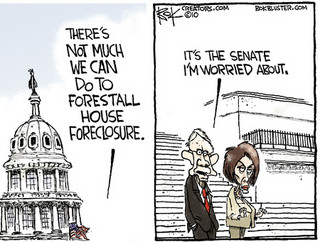The California Legislature enacted, and then revised, Code of Civil Procedure section 580e in response to the collapse of the housing market. As reported elsewhere, 580e now prohibits deficiencies whenever a short sale is approved by a lender on a residential property. Prior to that, it was common for lenders to claim the borrower owed the balance of the loan not paid off in the short sale. However, a decision this summer, applying the law as it existed prior to 580e, held that 580b prohibited collection of a deficiency after a short sale. The decision ignores some language in 580b, but now provides an argument for deficiency protection in short sales prior to the effective date of 580e.
****NOTE*** Since this was written, The justices of The California Supreme Court, at their weekly conference in San Francisco Wednesday Nov 22, voted 6-0 to grant review of this decision, thus it is not a final decision.
 In Carol Coker v. JP Morgan Chase Bank, N.A., Coker owed $452,000 purchase money debt for her property in San Diego. She stopped paying the loan, and a notice of default was recorded. She negotiated a short sale, which Chase Bank approved subject to several conditions. The important one here is that the amount of the sale proceeds paid to Chase Bank was for the release of Chase Bank’s security interest only, and Coker was still responsible for any deficiency balance remaining on the loan after application of the proceeds received by Chase Bank. This was typical of the requirements seen by Sacramento Real Estate attorneys a few years ago; sometimes, the lender would require the seller/borrower to sign a new promissory note. The sale closed, and Chase Bank sicced a collection agency on Coker, demanding $116,686. Coker filed this lawsuit for declaratory relief, seeking a ruling from the court that 580b and 580e prohibited Chase Bank from collecting a deficiency based on this loan. 580e did not apply retroactively, so the court dismissed that claim. On appeal, however, the court found that 580b did apply to prohibit the deficiency.
In Carol Coker v. JP Morgan Chase Bank, N.A., Coker owed $452,000 purchase money debt for her property in San Diego. She stopped paying the loan, and a notice of default was recorded. She negotiated a short sale, which Chase Bank approved subject to several conditions. The important one here is that the amount of the sale proceeds paid to Chase Bank was for the release of Chase Bank’s security interest only, and Coker was still responsible for any deficiency balance remaining on the loan after application of the proceeds received by Chase Bank. This was typical of the requirements seen by Sacramento Real Estate attorneys a few years ago; sometimes, the lender would require the seller/borrower to sign a new promissory note. The sale closed, and Chase Bank sicced a collection agency on Coker, demanding $116,686. Coker filed this lawsuit for declaratory relief, seeking a ruling from the court that 580b and 580e prohibited Chase Bank from collecting a deficiency based on this loan. 580e did not apply retroactively, so the court dismissed that claim. On appeal, however, the court found that 580b did apply to prohibit the deficiency.
The appellate court ruled that 580b does not require a foreclosure, and that it applies to any residential purchase money loan, regardless of how the property was sold -foreclosure, short sale, or otherwise. It focused on the following bolded language in 580b subsection (1):
“No deficiency judgment shall lie in any event… after a sale of real property or an estate for years therein for failure of the purchaser to complete his or her contract of sale.”
 It noted that there was no language modifying the term “sale,” and therefore it applies to all sales. Foreclosure is not required to trigger the protections of the statute. But what about the rest of that sentence – “for failure of the purchaser to complete his or her contract of sale”? Subsection (1) applies to an installment contract, not a note and deed of trust. Deeds of trust are covered in subsections (2) and (3), and there the term “sale” never appears. Since Coker financed her property with a deed of trust, subdivision (1) should not apply.
It noted that there was no language modifying the term “sale,” and therefore it applies to all sales. Foreclosure is not required to trigger the protections of the statute. But what about the rest of that sentence – “for failure of the purchaser to complete his or her contract of sale”? Subsection (1) applies to an installment contract, not a note and deed of trust. Deeds of trust are covered in subsections (2) and (3), and there the term “sale” never appears. Since Coker financed her property with a deed of trust, subdivision (1) should not apply.
This decision may change the landscape for short sales conducted before 580e went into effect. Based on this decision, borrowers who agreed to remain liable for the balance of the loan may have a defense to collection efforts. 580b definitely applies to purchase money loans. Though Coker agreed to the terms with Chase, in effect waiving the protection of 580b, courts have found that 580b can never be waived. DeBerard Props., Ltd. v Lim (1999) 20 C4th 659.
Photos:
http://www.flickr.com/photos/truliavisuals/5241592552/sizes/n/in/photostream/
http://www.flickr.com/photos/sully_aka__wstera2/5104269349/sizes/n/in/photostream/
 California Real Estate Lawyers Blog
California Real Estate Lawyers Blog

